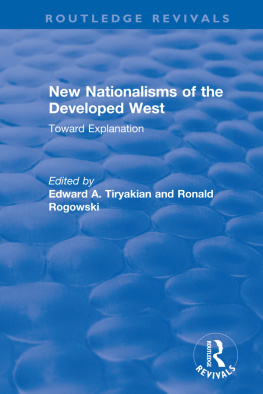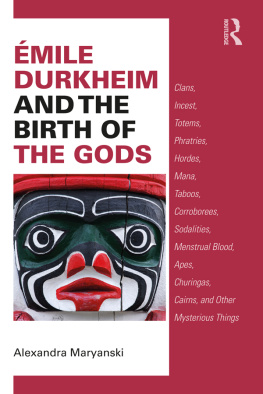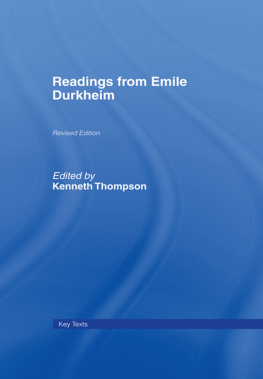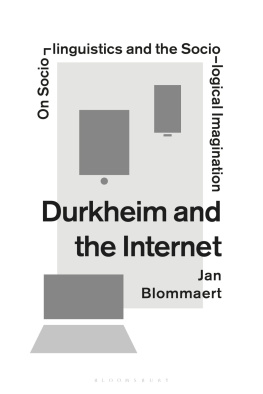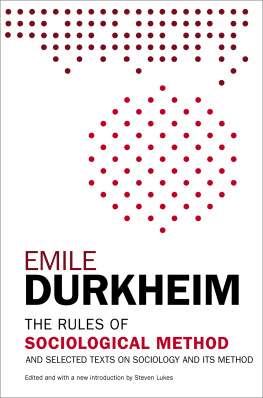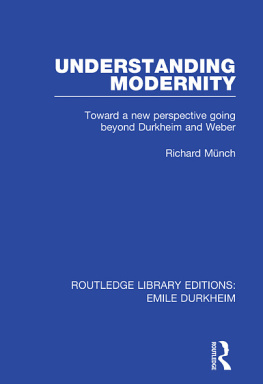For Durkheim
Rethinking Classical Sociology
Series Editor: David Chalcraft, University of Derby, UK
This series is designed to capture, reflect and promote the major changes that are occurring in the burgeoning field of classical sociology. The series publishes monographs, texts and reference volumes that critically engage with the established figures in classical sociology as well as encouraging examination of thinkers and texts from within the ever-widening canon of classical sociology. Engagement derives from theoretical and substantive advances within sociology and involves critical dialogue between contemporary and classical positions. The series reflects new interests and concerns including feminist perspectives, linguistic and cultural turns, the history of the discipline, the biographical and cultural milieux of texts, authors and interpreters, and the interfaces between the sociological imagination and other discourses including science, anthropology, history, theology and literature.
The series offers fresh readings and insights that will ensure the continued relevance of the classical sociological imagination in contemporary work and maintain the highest standards of scholarship and enquiry in this developing area of research.
Also in the series:
Max Weber Matters
Interweaving Past and Present
Edited by David Chalcraft, Fanon Howell, Marisol Lopez Menendez, Hector Vera
ISBN 978-0-7546-7340-8
Karl Mannheim and the Legacy of Max Weber
Retrieving a Research Programme
David Kettler, Colin Loader and Volker Meja
ISBN 978-0-7546-7224 1
Vilfredo Paretos Sociology
A Framework for Political Psychology
Alasdair J. Marshall
ISBN 978-0-7546-4978-6
First published 2009 by Ashgate Publishing
Published 2016 by Routledge
2 Park Square, Milton Park, Abingdon, Oxon OX14 4RN
711 Third Avenue, New York, NY 10017, USA
Routledge is an imprint of the Taylor & Francis Group, an informa business
Copyright Edward A. Tiryakian 2009
Edward A. Tiryakian has asserted his right under the Copyright, Designs and Patents Act, 1988, to be identified as the author of this work.
All rights reserved. No part of this book may be reprinted or reproduced or utilised in any form or by any electronic, mechanical, or other means, now known or hereafter invented, including photocopying and recording, or in any information storage or retrieval system, without permission in writing from the publishers.
Notice:
Product or corporate names may be trademarks or registered trademarks, and are used only for identification and explanation without intent to infringe.
British Library Cataloguing in Publication Data
Tiryakian, Edward A.
For Durkheim: essays in historical and cultural sociology.
- (Rethinking classical sociology)
1. Durkheim, Emile, 1858-1917 2. Weber, Max, 1864-1920
3. Durkheimian school of sociology 4. Sociology
I. Title
301'.092
Library of Congress Cataloging-in-Publication Data
Tiryakian, Edward A.
For Durkheim: essays in historical and cultural sociology / by Edward A. Tiryakian.
p. cm. -- (Rethinking classical sociology)
Includes index.
ISBN 978-0-7546-7155-8
1. Durkheim, Imile, 1858-1917. 2. Sociology--History. 3. Culture. I. Title.
HM465.T57 2009
301.092--dc22
2008049693
ISBN 13: 978-0-7546-7155-8 (hbk)
Contents
List of Tables
Series Editors Preface
Acknowledgements
Permissions
Part 1 (Re) Discovering Durkheim
Part 2 Durkheim and Cultural Change
Part 3 Durkheim and Weber
Appendix
With For Durkheim, we publish the second volume in our series that engages directly with the work of Durkheim (and in fact Professor Tiryakian the author of the former has reviewed in Contemporary Sociology that first volume in our series by Jonathan Fish), and there are further volumes in the pipeline. These publications verify that even in the context of the contested and expanded canon of classical sociological thinkers and texts, Durkheim, alongside his slightly younger contemporary, Max Weber, and alongside the older Marx, is still a force to be reckoned with and a source that beckons to contemporary theorists. The title For Durkheim of course resonates with previous rethinking of classical thinkers-namely, Althussers For Marx (1965) and Bryan Turners For Weber (1981). As Tiryakian says, this was a conscious decision. At the same time, the volume recalls aspects of Gouldners For Sociology (1973) since what is provided is not merely advocacy for a Durkheimian position, but for using Durkheim as both a subject in his own right and as a source for unravelling contemporary social and cultural processes; as such, an advocacy for sociological analysis undertaken in continuity with the sociological tradition an intent shared with Gouldners earlier volume.
Professor Tiryakian is a Durkheimian scholar. But he is also so much more than this. As he has written in his essay, Have Sociological Passport, Will Travel: I consider Emile Durkheim and Max Weber as major totems; Talcott Parsons and Pitirim Sorokin as my major personal mentors (in Sociologists in a Global Age, edited by Mathieu Deflem, Ashgate, 2007). Hence, the reader will find a whole section of the volume, For Durkheim, engaging with the legacy of Weber in this connection. Moreover, Professor Tiryakians work, produced now for more than six decades, includes analysis of religion, ethnicity and ethnic conflicts, national identity, development and modernity. The work of Professor Tiryakian demonstrates the relevance to a range of substantive areas, of thinking with classical theory in mind.
For Durkheim is also a volume important to rethinking classical sociology as whole, since it demonstrates, in general and in key chapters, the manner in which sociology is often a part of the very culture it seeks to comprehend. This involves seeing classical sociology as including a classical cultural sociology, as well as approaching classical sociology with cultural sociological questions in mind. Sociological writing, that is to say, is often part of a more general intellectual interaction with social change, such that it shares concerns and tropes with other discourses in theology, literature or art. These interrelations, the interaction of classical sociological and literary and artistic imaginations, can characterise the texts that the classical sociologists composed, affecting their forms and means of expressions. These interrelations also can be detected in the content of classical sociology, in terms of the social problems considered significant, or in a response to modernity or to contemporary malaise that is also appreciated, analysed and reacted to in other cultural movements and productions.
For example, Simmels The Metropolis and Mental Life (1903) provides a well-known cultural sociological response to a gigantic social form that had major consequences, Simmel argued, for individual psychology, the development of specific forms of the division of labour, for particular attitudes (most famously the Blas outlook) and social types, and of course for social relations. It would be foolish to think that it was only sociology that was conscious of these changes and that it was only sociological writing that wrestled with the phenomena; that it was only sociological narratives and mimetic modes that were altered. On the contrary, the cultural movements in Berlin, in Munich, in London, in Paris, in New York and Chicago equally responded to these cataclysmic changes (for sure, in diverse ways representing, for example, a drive to document, or an embrace and fascination, or a desire to escape for example). The atonality of Schoenberg and the mechanical strident rhythms of Stravinsky, the cityscapes of Kirchner, Knut Hamsuns exploration of modernist shame in Nordic Christiania in


